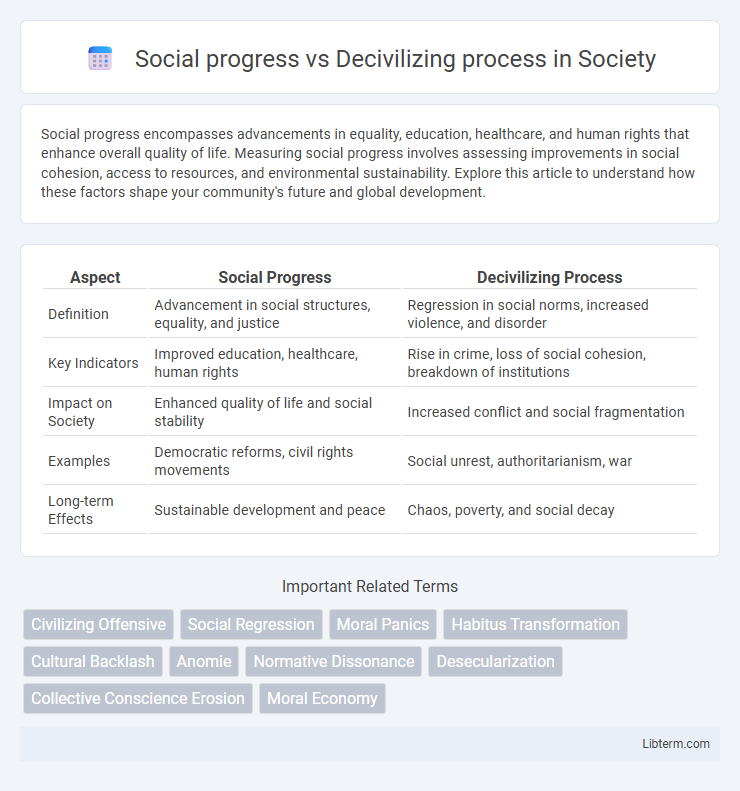Social progress encompasses advancements in equality, education, healthcare, and human rights that enhance overall quality of life. Measuring social progress involves assessing improvements in social cohesion, access to resources, and environmental sustainability. Explore this article to understand how these factors shape your community's future and global development.
Table of Comparison
| Aspect | Social Progress | Decivilizing Process |
|---|---|---|
| Definition | Advancement in social structures, equality, and justice | Regression in social norms, increased violence, and disorder |
| Key Indicators | Improved education, healthcare, human rights | Rise in crime, loss of social cohesion, breakdown of institutions |
| Impact on Society | Enhanced quality of life and social stability | Increased conflict and social fragmentation |
| Examples | Democratic reforms, civil rights movements | Social unrest, authoritarianism, war |
| Long-term Effects | Sustainable development and peace | Chaos, poverty, and social decay |
Understanding Social Progress: Definitions and Indicators
Social progress refers to measurable improvements in human well-being, encompassing factors such as education, healthcare access, economic equity, and environmental sustainability, while the decivilizing process denotes societal regression marked by increased violence, erosion of social norms, and institutional breakdown. Key indicators of social progress include rising literacy rates, reduced poverty levels, enhanced life expectancy, and strengthened democratic governance, which collectively reflect advancements in quality of life and social cohesion. Understanding these indicators helps differentiate positive societal development from signs of social decay and informs policy aimed at fostering sustainable human development.
The Decivilizing Process: Origins and Key Concepts
The decivilizing process, a term coined by sociologist Norbert Elias, explores the regression of social norms and increasing violence within societies, contrasting with the idea of continuous social progress. Its origins trace back to historical shifts where the restraint and self-control cultivated in Western societies began to unravel, leading to heightened impulsiveness and aggression. Key concepts include the breakdown of established etiquette, the resurgence of barbaric behaviors, and the destabilization of civil order as previously internalized social controls weaken.
Historical Perspectives: Progress and Regression
Historical perspectives reveal that social progress often manifests through advancements in education, governance, and human rights, fostering increased societal cohesion and welfare. Conversely, decivilizing processes emerge during periods of conflict, economic collapse, or cultural disintegration, characterized by the erosion of social norms and institutional breakdown. The cyclical tension between progress and regression underscores the complex dynamics shaping civilizations' evolution over time.
Comparing Theories: Civilizing vs. Decivilizing Processes
Theories of social progress often contrast Norbert Elias's Civilizing Process, which emphasizes long-term development of social norms, self-restraint, and increasing complexity in social behavior, with theories of decivilizing processes that highlight regression, social breakdown, and resurgence of violence. Civilizing theory argues that societal evolution leads to stronger state control and internalized social etiquette, while decivilizing theories underscore instability caused by crises, war, or political upheaval, resulting in diminished social cohesion. Comparing these perspectives reveals how social progress is not linear but contingent on historical, economic, and cultural dynamics influencing the oscillation between order and disorder.
Drivers of Social Progress in Modern Societies
Technological innovation, inclusive education, and improved healthcare infrastructure drive social progress in modern societies by enhancing quality of life and expanding opportunities for all. Economic development combined with strong governance fosters social cohesion, reducing inequalities and promoting collective well-being. Civic engagement and digital connectivity empower communities to address social challenges proactively, countering tendencies of decivilizing processes such as social fragmentation and rising authoritarianism.
Manifestations of Decivilization Today
Manifestations of decivilization today include rising social fragmentation, increasing violence, and erosion of trust in institutions. These phenomena contrast with social progress indicators such as enhanced human rights, technological advancements, and improved education access. Understanding the interplay between decivilizing trends and social development reveals challenges to maintaining cohesive, functioning societies.
Sociopolitical Factors Influencing Both Phenomena
Sociopolitical factors such as governance quality, social policies, and institutional trust critically influence the trajectory of social progress or a decivilizing process. Effective governance and inclusive social policies promote equity, civic engagement, and rule of law, fostering social cohesion and progress. Conversely, political instability, corruption, and rising inequality often trigger social fragmentation, undermining civil norms and accelerating decivilization.
Case Studies: Social Progress and Decivilization in Action
Case studies of social progress reveal improvements in education access, healthcare quality, and economic inclusion, driving community resilience and cohesion. Conversely, instances of decivilizing processes demonstrate rising social fragmentation, increased conflict, and erosion of institutional trust, often linked to economic instability and political polarization. Analyzing these contrasting dynamics highlights the crucial role of stable governance and inclusive policies in either fostering social advancement or accelerating societal decay.
Balancing Advancement and Regress: Societal Challenges
Societal progress often involves expanding education, technology, and global connectivity, which drive economic growth and enhance quality of life. However, this advancement can be undermined by decivilizing processes such as increased social fragmentation, inequality, and erosion of civic norms. Balancing these challenges requires proactive policies promoting inclusion, rule of law, and cultural cohesion to ensure sustainable development and prevent regression into social instability.
Future Outlook: Navigating Progress and Decivilization
Future outlooks on social progress versus decivilizing processes emphasize the delicate balance between technological innovation, ethical governance, and cultural resilience. Advances in artificial intelligence, climate action, and global cooperation can drive sustained social development, while unchecked social fragmentation, misinformation, and resource depletion risk accelerating social decay. Effective navigation requires adaptive policies prioritizing inclusive growth, digital literacy, and community empowerment to foster cohesive and resilient societies.
Social progress Infographic

 libterm.com
libterm.com